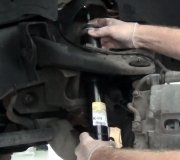Unless there is something I am not aware of, the bearing assembly does not get damaged by replacing struts. If I understand correctly, you are saying you were told it can happen from the car being on the hoist too long? That is not correct. Under normal conditions each front bearing assembly holds up over 1,000 pounds of the car's weight, and bumps and pot holes can easily add another temporary 1,000 pounds of force. By hanging in the air on a hoist, the bearings are holding up the weight of the wheel and tire which is around 50 pounds.
What can and usually and will damage a bearing is placing any vehicle weight on it while the axle nut is not fully tightened to specs, typically around 180 foot-pounds. That nut is loosened when replacing the half shaft or the bearing, but not for any other reason or service, including struts. This is what I mean, "unless there is something I am not aware of". Even brand new bearings will be damaged if the car is set on the ground before that nut is fully tightened. They will instantly become noisy and sound like the buzzing of an airplane engine. That will become very irritating but it is not a safety issue until it gets much worse over many months. I have known people to live with that noise for years. Only once did I see one so bad that the wheel was not being held in alignment. It was able to flop around because the bearing had been ignored for so long.
It also sounds like the communication could have been better about how the bearing is replaced. Chrysler used to use a pressed-in bearing that was extremely inexpensive, as in $25.00, but required special tools and about an hour to replace. Ford, and many imports, still use that design. GM has always used a bolt-on assembly. Those can cost around $150.00, (give or take 50 bucks), but if things are not too rusty it can be replaced in about a half hour. That is what Chrysler has gone to. Both types can be replaced in such a manner that the alignment is not disturbed.
Many of the imports now have a hub and bearing already assembled that costs more for the part but is considerably easier to replace than with the original parts. Most mechanics prefer those assemblies because they get the job done faster. Our experience shows people complain much less about the cost of parts than they do the labor charges. There is also less chance of damaging the hub or the new bearing during installation.
As far as who is responsible for this repair, my first question would be if at any time during the recent services that axle nut was loosened or removed. If it was, and it was not re-tightened to specs, you would have noticed the buzzing noise right away. The shop should cover that. If the nut was never touched, the bearing likely failed on its own, and at the mileage you listed, that is not uncommon. If it failed on its own, the buzzing noise would have come on gradually over some weeks, but it can go unnoticed for a long time until it gets too loud to ignore. If other parts were making noises, you could have not noticed a bearing becoming noisy until everything else was fixed. I've run into that a few times where the owner noticed the air turbulence over wiper arms once the wind leak was fixed on the driver's door.
$500.00 seems too much for this repair. The only bearing I found listed for your car is the pressed-in style like Chrysler used in the 1980's. The part should cost around $50.00 to $75.00. I did a lot of these during the ten years I worked for a very nice family-owned Chrysler dealership in the 1990's, and each one took about an hour. You do the math to calculate how much they're expecting to charge for labor. What I would suggest is visiting another shop and asking them to provide a written estimate for this repair. Most shops use a "flat rate" guide that spells out the number of hours each procedure for each car model and year should take. That allows every shop to charge the same amount of time, regardless how long the mechanic actually takes. The only variables then are the cost of the bearing and their hourly shop rate. Flat rate does not take into account severe rust / rounded off bolt heads, broken fasteners, reattaching brake pad anti-rattle devices that might have become mispositioned, and weird things like that. Much of that is supposed to be included in the service, but they cannot foresee problems caused by rust, so they may charge for a little extra time for those things. At worst, again, unless there's something I am not aware of, I would expect to charge around $200.00 for a new wheel bearing. Your second estimate will tell you if the first shop has gotten a little exuberant with your wallet.
Friday, April 22nd, 2016 AT 9:27 PM



